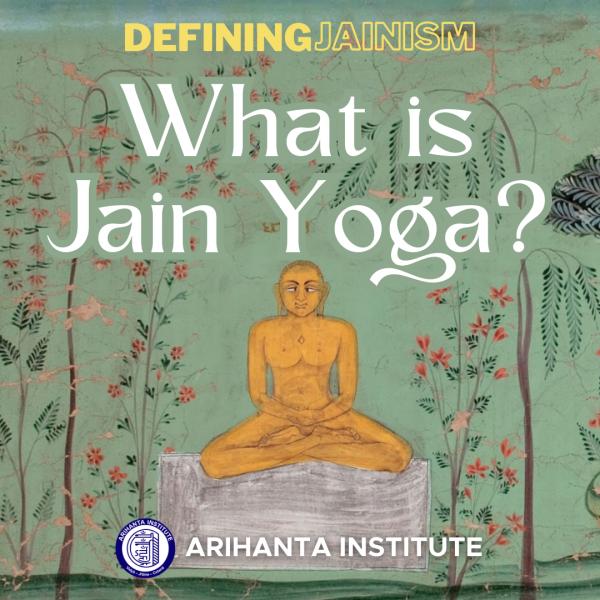
Yoga in Jainism Conference
2nd Annual Engaged Jain Studies Conference
Virtual Event
Watch the Replays



About the event
About the event
2nd Annual Engaged Jain Studies Conference: “Yoga in Jainism”
Hosted and sponsored by Arihanta Institute, the Yoga in Jainism online conference explores the burgeoning field of Jain Yoga Studies, delving into the intersection of Jain yoga texts, ideas, and practices with a focus on engaging Jain perspectives on social issues such as environmental concerns, animal advocacy, war, racism, casteism, and gender justice.
This free, one-day online event also aims to provide a platform for scholars and practitioners to discuss the historical, social, and intellectual dimensions of Jain yoga, fostering a dialogue that spans modern and pre-modern contexts within South Asia, the global Jain diaspora, and beyond.
We hope you can join us!
**********
The field of Jain Yoga Studies is rapidly developing and is occupying an increasing share within the general field of Yoga Studies. Where Yoga Studies includes textual and practical studies from the perspective of the humanities and philosophy and/or the social sciences, Jain Yoga Studies seeks the same within the Jain milieu. There are a number of Jain texts that are explicitly “yoga” texts (e.g. the Yoga-bindu, the Yoga-dṛṣṭi-samuccaya, or the Yoga-śāstra) and there are others which might not specifically identify as “yoga texts” but may have yogic elements such as meditation, contemplative practices, or other spiritual disciplines or ideas that are recognizable as part of the broader pan-Indic rubric of yoga. In terms of practice, we can see examples of Jain thinkers and practitioners who have been influential in pre-modern times, modern times, and those who are currently defining Jain yoga in dialogue with the modern, transnational yoga movement. Moreover, Jain Yoga Studies has much to offer within an increasing movement within Yoga Studies to articulate ways that yoga can “engage” with various social issues and with interdisciplinary theories and fields of social change so that we can speak of “Engaged Yoga Studies” in terms of how Jain yoga texts, ideas, and practices can interact with issues of social justice, such as environmental issues, issues of animal advocacy, war, racism, casteism, nonviolent political activism, and justice issues regarding gender and/or sexuality.
This conference has been conceived as a means of bringing Jains and Jain Studies into the broader academic and non-academic discourses regarding yoga and social engagement. This conference will create a platform so that the unique approach of the Jain tradition can be understood in dialogue with the broader field of yoga, and so that the distinct resources within the Jain tradition can be engaged with important issues of social and structural violence that affect us in modern times.
Our goal in this conference is to carefully define and expand the methods and approaches that can be used to research the ways that Jain yoga teachings and practices have been understood historically, socially, and within the intellectual history of South Asia. We also seek to highlight innovative ways that Jain Yoga can be brought into practice in everyday life with regards to issues pertaining to society, animals, and the planet. These principles begin with, but are not limited to, ahiṃsā, aparigraha, anekāntavāda, and anukampā/jīvadayā/karuṇa, etc.
In this conference, notable scholars will demonstrate the ways by which the Jain yoga tradition has been defined, theorized, and practiced worldwide in either modern or pre-modern contexts, in South Asia, in the Jain diaspora, or in dialogue with the modern, transnational yoga movement. Approaches will be critical, constructive, or some blend of both, and can include, but are not limited to, textual, philological, philosophical, cultural, historical, ethical, and/or practical ways that can advance the interdisciplinary study of Jain yoga.
Hosted and sponsored by Arihanta Institute, the Yoga in Jainism online conference explores the burgeoning field of Jain Yoga Studies, delving into the intersection of Jain yoga texts, ideas, and practices with a focus on engaging Jain perspectives on social issues such as environmental concerns, animal advocacy, war, racism, casteism, and gender justice.
This free, one-day online event also aims to provide a platform for scholars and practitioners to discuss the historical, social, and intellectual dimensions of Jain yoga, fostering a dialogue that spans modern and pre-modern contexts within South Asia, the global Jain diaspora, and beyond.
We hope you can join us!
**********
The field of Jain Yoga Studies is rapidly developing and is occupying an increasing share within the general field of Yoga Studies. Where Yoga Studies includes textual and practical studies from the perspective of the humanities and philosophy and/or the social sciences, Jain Yoga Studies seeks the same within the Jain milieu. There are a number of Jain texts that are explicitly “yoga” texts (e.g. the Yoga-bindu, the Yoga-dṛṣṭi-samuccaya, or the Yoga-śāstra) and there are others which might not specifically identify as “yoga texts” but may have yogic elements such as meditation, contemplative practices, or other spiritual disciplines or ideas that are recognizable as part of the broader pan-Indic rubric of yoga. In terms of practice, we can see examples of Jain thinkers and practitioners who have been influential in pre-modern times, modern times, and those who are currently defining Jain yoga in dialogue with the modern, transnational yoga movement. Moreover, Jain Yoga Studies has much to offer within an increasing movement within Yoga Studies to articulate ways that yoga can “engage” with various social issues and with interdisciplinary theories and fields of social change so that we can speak of “Engaged Yoga Studies” in terms of how Jain yoga texts, ideas, and practices can interact with issues of social justice, such as environmental issues, issues of animal advocacy, war, racism, casteism, nonviolent political activism, and justice issues regarding gender and/or sexuality.
This conference has been conceived as a means of bringing Jains and Jain Studies into the broader academic and non-academic discourses regarding yoga and social engagement. This conference will create a platform so that the unique approach of the Jain tradition can be understood in dialogue with the broader field of yoga, and so that the distinct resources within the Jain tradition can be engaged with important issues of social and structural violence that affect us in modern times.
Our goal in this conference is to carefully define and expand the methods and approaches that can be used to research the ways that Jain yoga teachings and practices have been understood historically, socially, and within the intellectual history of South Asia. We also seek to highlight innovative ways that Jain Yoga can be brought into practice in everyday life with regards to issues pertaining to society, animals, and the planet. These principles begin with, but are not limited to, ahiṃsā, aparigraha, anekāntavāda, and anukampā/jīvadayā/karuṇa, etc.
In this conference, notable scholars will demonstrate the ways by which the Jain yoga tradition has been defined, theorized, and practiced worldwide in either modern or pre-modern contexts, in South Asia, in the Jain diaspora, or in dialogue with the modern, transnational yoga movement. Approaches will be critical, constructive, or some blend of both, and can include, but are not limited to, textual, philological, philosophical, cultural, historical, ethical, and/or practical ways that can advance the interdisciplinary study of Jain yoga.











